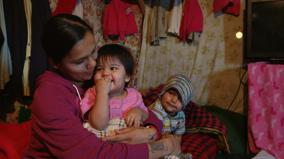New release
Coming
None
 Jordan River Anderson, The Messenger
Jordan River Anderson, The Messenger
2019
1 h 5 min
Leaving soon
Alanis Obomsawin's 52nd film tells the story of how the life of Jordan River Anderson initiated a battle for the right of First Nations and Inuit children to receive the same standard of social, health and educational services as the rest of the Canadian population.

Details
Alanis Obomsawin's 52nd film tells the story of how the life of Jordan River Anderson initiated a battle for the right of First Nations and Inuit children to receive the same standard of social, health and educational services as the rest of the Canadian population.
Also available on the
Alanis Obomsawin: A Legacy DVD box set
-
directorAlanis Obomsawin
-
writerAlanis Obomsawin
-
editorAlison Burns
-
cameraMaarten KroonenburgBen LowKent NasonPedro RuizRené Sioui LabelleMartin Duckworth
-
drone footageRobert Rideout
-
location soundTod Van DykLynne TrépanierThierry Morlass-LurbeGaëlle Komàr
-
sound editorDon Ayer
-
production assistantRyan Queskekapow
-
guide/driverRichard Jackson
-
original musicLauren BélecMichel Dubeau
-
musicianMichel DubeauLauren Bélec
-
narrationAlanis Obomsawin
-
voice recordingGeoffrey Mitchell
-
music pre-mixGeoffrey Mitchell
-
animationGlenn Gear
-
Cree translationMadeline Gamblin
-
researchAlanis ObomsawinKatherine Kasirer
-
rights clearancesKatherine Kasirer
-
on-lineDenis Pilon
-
graphic designMélanie BouchardJacques-Bertrand Simard
-
titlesMélanie BouchardJacques-Bertrand Simard
-
digital editing technicianPierre DupontIsabelle PainchaudPatrick Trahan
-
technical coordinatorDaniel LordMira Mailhot
-
marketing managerFrançois Jacques
-
marketing coordinatorSophie ThouinJolène Lessard
-
publicistPatricia Dillon-MooreJennifer Mair
-
legal counselDominique Aubry
-
production coordinatorChristine Williams
-
senior production coordinatorCamila Blos
-
studio administratorCamila BlosLeslie Anne Poyntz
-
producerAlanis Obomsawin
-
executive producerAnnette Clarke
-
executive directorMichelle van Beusekom
Education
Ages 15 to 18
Mini-lessons
School subjects
















